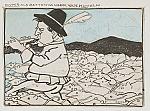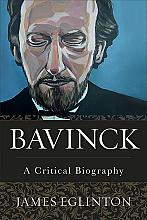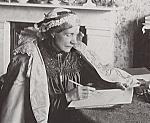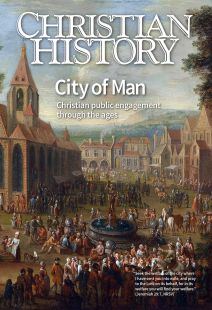Christian History Timeline: City of God, City of Man
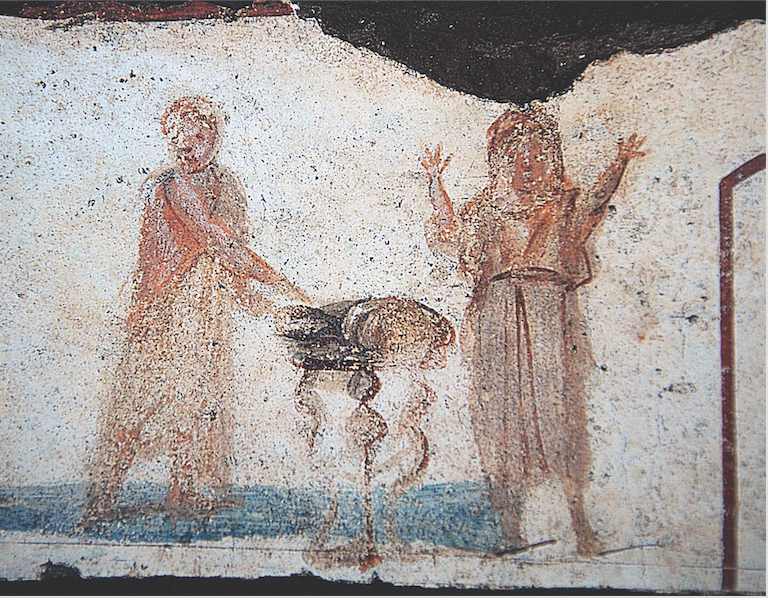
[Painting in the Early-Christian catacomb of San Callisto (Saint Calixte Catacomb)—David Macchi / [public domain] Wikimedia]
— c. 96 The First Letter of Clement urges Christians to pray for and serve others.
— c. 130–200 Epistle to Diognetus describes early church civic engagement.
— 313 Constantine ends formal persecution of Christians.
— 380 Christianity becomes the official religion of the Roman Empire. Around this time Basil of Caesarea founds the Basiliad, a precursor to modern hospitals.
— c. early 400s Daniel the Stylite combines monastic isolation with advising Emperor Leo I.
— 426 Augustine publishes City of God.
— 516 Benedict writes his Rule and begins to establish the Benedictine order, where monks and nuns live in community rather than as hermits.
— 532 Justinian begins the construction of Hagia Sophia, which will be consecrated in 537.
— c. 588 Symeon the Holy Fool, one of the first “fools for Christ,” dies in Edessa.
— 590 Gregory the Great becomes pope; some time after this, he writes the Dialogues including the “Life of St. Benedict.”
— 797 Empress Irene begins her troubled reign as sole ruler of the Byzantine Empire.
— 843 Empress Theodora ends the iconoclastic controversy by restoring icons to Byzantine worship.
— 989 The Peace of God Movement —an effort to reduce violence among feuding nobles—is proclaimed.
— 1019 Svjatopolk of Kiev kills his half-brothers, Boris and Gleb, who refuse to commit violence against him; they become celebrated as Orthodox martyrs.
— 1027 The Truce of God Movement is proclaimed.
— 1098 The Cistercians are founded; like the Benedictines, they will become politically powerful.
— c. 1200 The first confraternities are founded; they feature laypeople gathering to promote works of piety and mercy as well as art and culture.
— 1216 The Dominicans are founded and soon become leaders in education.
— c. 1220 Alexander Nevsky of Novgorod, a famous Orthodox royal saint, is born.
— 1462 The first mons pietatis (an institution that lent money to the poor at reasonable interest) opens in Italy.
— 1522 Martin Luther publishes “The Estate of Marriage.”
— 1523 Luther publishes Temporal Authority: To What Extent It Ought to Be Obeyed.
— 1525 Luther publishes Against the Murderous, Thieving Hordes of Peasants.
— 1633 The Daughters of Charity are founded.
— c. 1719 Xenia, one of the modern “holy fools,” is born in Russia.
— 1826 The American Temperance Society is founded.
— 1833 The American Anti-Slavery Society is founded.
— 1835 Alexis de Tocqueville publishes the first volume of Democracy in America.
— 1869 Josephine Butler begins campaigning against the Contagious Disease Acts.
— 1879 Katharine Bushnell goes to India as a doctor.
— 1885 Butler begins to work against child prostitution. Horace Underwood first goes to Korea.
— c. 1890s Many American churches begin observing the Sunday before Labor Day as “Labor Sunday.”
— 1894 The short-lived Modern Church is founded as a church for working people.
— 1898 Abraham Kuyper delivers his Lectures on Calvinism.
— 1901 Kuyper becomes prime minister of the Netherlands.
— 1902 Herman Bavinck succeeds Kuyper as professor of theology at the Free University.
— 1908 The Methodist Episcopal Church publishes its influential Social Creed.
— 1909 After the death of her husband Sergei, Elizabeth Feodorovna opens a convent that serves the poor. She is later canonized as an Orthodox royal saint.
— 1923 Bushnell publishes God’s Word to Women.
— 1932 Maria Skobtsova takes monastic vows on the condition that she can continue to live in and serve the world. She becomes a rescuer of Jews from the Nazis.
— 1933 The “church struggle” over Nazism begins in Germany.
— 1934 Leaders of the Confessing Church release the Barmen Declaration.
— 1937 Bonhoeffer publishes The Cost of Discipleship.
— 1939 Bonhoeffer becomes involved in the plot to kill Hitler.
— 1943 Archbishop Damaskinos of Athens denounces the deportation of Jews from Greece.
— 1948 The apartheid era begins in South Africa, prompting significant resistance among Christians and others.
— 1955 Francis and Edith Schaeffer launch L’Abri.
— 1956 Billy Graham founds Christianity Today with Carl Henry as its first editor.
— 1979 Schaeffer and his son Franky release Whatever Happened to the Human Race?
— 1994 The election of Nelson Mandela as president of South Africa officially ends apartheid.
By The editors
[Christian History originally published this article in Christian History Issue #141 in 2021]
Next articles
God rules over the cosmos
Abraham Kuyper argued for God’s sovereignty over all spheres of human life
Jessica JoustraThe national spirit
Two men whose civic engagement connected Christianity to korean independence
In Soo KimRepresentative of the outcast
Josephine Butler’s civic engagement helped improve the lives of Victorian women
Jane RobinsonSupport us
Christian History Institute (CHI) is a non-profit Pennsylvania corporation founded in 1982. Your donations support the continuation of this ministry
Donate



